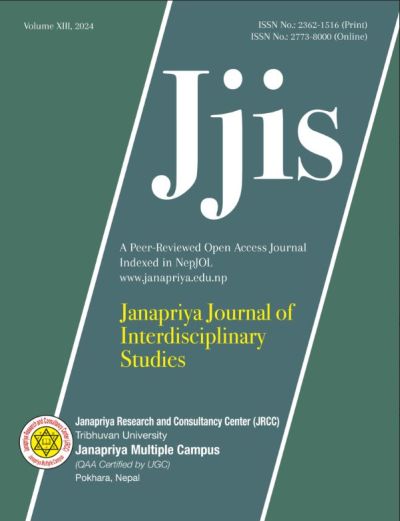Empirical Investigation of Inflation Dynamics in Nepal: A Multivariate Co-integration and VECM Framework
DOI:
https://doi.org/10.3126/jjis.v13i1.75532Keywords:
Budget deficit, inflation, money supply, aggregate demand, government expenditureAbstract
This study investigates the determinants of inflation in Nepal using annual time series data from 1975 to 2022, employing the Engle-Granger co-integration technique, Vector Error Correction Model (VECM), and Granger causality tests. The research examines the relationships between inflation and key macroeconomic variables including budget deficit, gross fixed capital formation, Indian inflation, broad money supply (M2), and private consumption. The empirical findings reveal significant relationships between these variables, with particularly strong bidirectional causality between inflation and budget deficits. The VECM results indicate that private consumption and money supply are crucial determinants of inflation in both the short and long run, with the error correction term showing an adjustment speed of approximately 11% per year toward equilibrium. This relatively slow adjustment suggests that inflationary shocks in Nepal tend to persist over time. The study also finds that Indian inflation significantly influences Nepal’s price levels, highlighting the strong economic interconnectedness between the two countries. While some variables like gross fixed capital formation show theoretical relevance, their statistical significance in the model is limited, possibly reflecting the complex nature of investment impacts on inflation. These findings have important policy implications, suggesting the need for coordinated fiscal and monetary policies, maintenance of sustainable fiscal positions, effective management of private consumption and money supply, and careful consideration of external economic factors in inflation management strategies. The study contributes to the existing literature by providing empirical evidence specific to Nepal’s context while supporting broader theoretical frameworks of inflation determination. The results underscore the complex and multifaceted nature of inflation in Nepal, where both domestic and external factors play significant roles, and suggest that successful inflation management requires a comprehensive policy approach that addresses fiscal discipline, monetary stability, and structural economic constraints while remaining mindful of international economic linkages.
Downloads
Downloads
Published
How to Cite
Issue
Section
License
Copyright (c) 2024 The Author(s)

This work is licensed under a Creative Commons Attribution-NonCommercial 4.0 International License.




